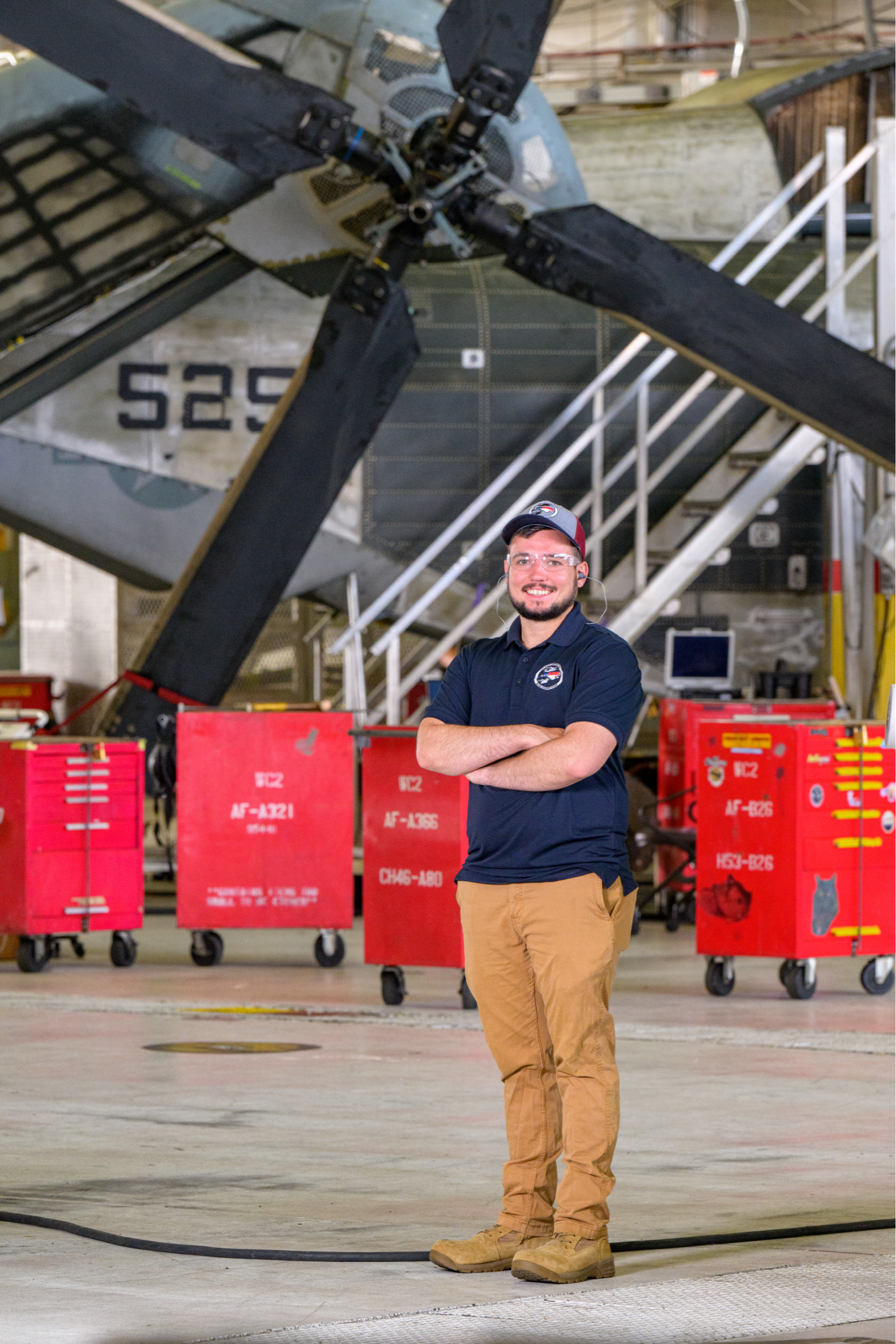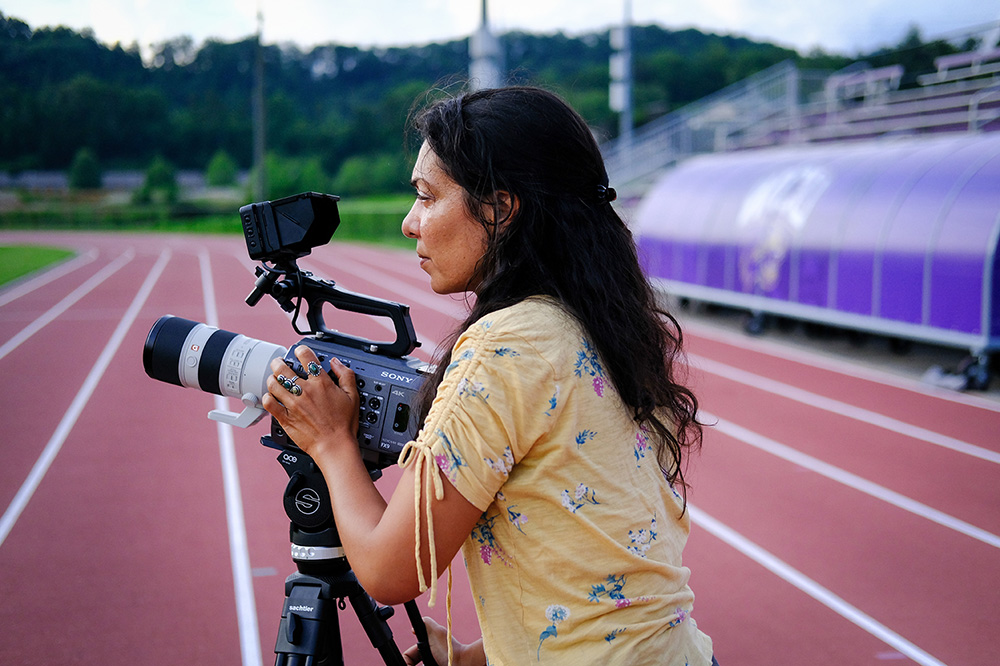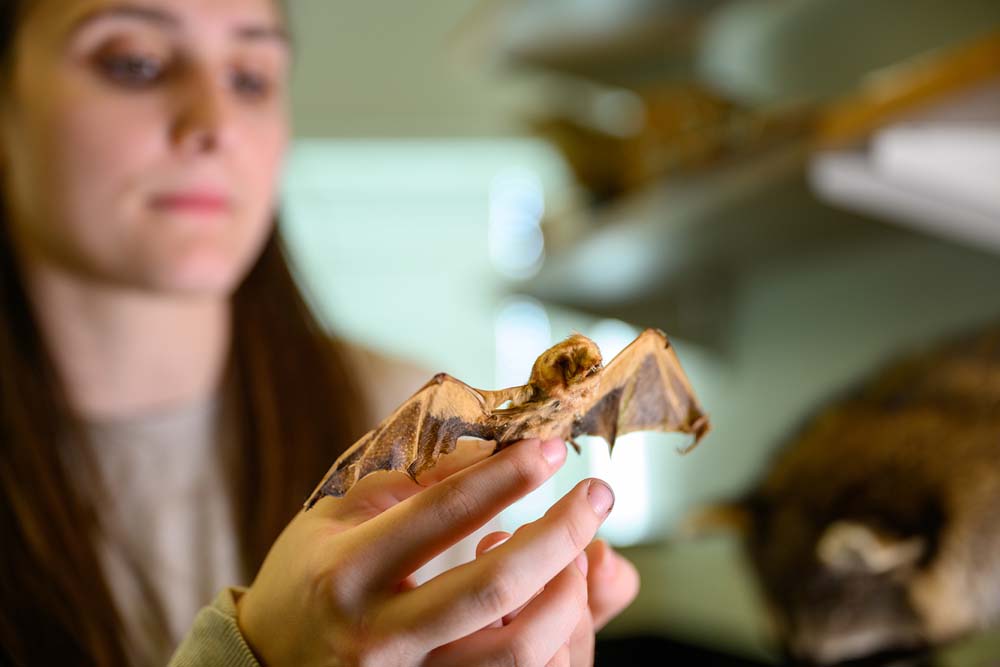





Engineering WNC
The College of Engineering and Technology prepares students for career success through project- based learning and productive partnerships with businesses and industries for economic development. by Julia Hartbarger Duvall ‘15
When Raleigh native Chase Robinson ’20 was deciding where he wanted to continue his education after earning his associate degree from Wake Technical Community College in 2018, he knew he wanted to go into engineering, but he also wanted to go somewhere he could explore another passion – fishing. “I had always wanted to be an engineer and was always very technical, so going to school for engineering just seemed like the right path,” Robinson said. “I was looking at Western Carolina University and I knew there would also be some great fly fishing in the area and that I could possibly get into guiding, so that helped in my decision to come to Cullowhee.”
Robinson credits Wes Stone, director of the School of Engineering and Technology, and Bob Adams, professor emeritus, with supporting him throughout his time at WCU. “Dr. Stone and Dr. Adams truly care about helping students advance their careers,” Robinson said. “I thoroughly enjoyed my time in the engineering program.”
Despite the COVID-19 pandemic upending the spring semester of 2020, during WCU’s spring job fair, Robinson connected with the Naval Air Systems Command’s Fleet Readiness Center East. “After the job fair I went through a few interviews and learned I would be part of the Fleet Support Team working in the rotor shop as a rotor systems engineer,” Robinson said. “We are basically ‘Triple-A’ for the Marines.”

Fleet Readiness Center East is located aboard the Marine Corps Air Station in Cherry Point. Since 1943, FRCE has played an important role in national defense and provides world-class maintenance, engineering and logistics support for Navy and Marine Corps aviation, as well as other armed services, federal agencies and foreign governments. Robinson’s team works on rotors for aircraft that include the CH-53E Super Stallion. The Super Stallion’s mission is transportation of heavy equipment and supplies for amphibious assault. It is capable of rapidly transporting troops and equipment from ship-to-shore, launching amphibious assaults, facilitating logistics and maintenance, providing sustainment and supplies, and equipping the warfighter for mission success.
The powerful aircraft can lift heavy military equipment yet is compact enough to fit onboard an amphibious warfare ship where it can take off carrying 16 tons of cargo and deliver it 50 miles away before returning to base. “This has been a great place to work and it is very rewarding to be part of one of the teams that overhaul the aircraft and get them back in the air,” Robinson said. “I am also able to do a lot of saltwater fishing.” Robinson praises WCU’s focus on the end-user and not only on the theoretical aspect of engineering projects for helping prepare him for his role at FRCE. “Western’s got a great focus on manufacturing and that there is a real person behind the project,” Robinson said. “The faculty really understand the benefit and give students great opportunities for hands-on learning.”
Consumer-focused
Understanding that the products manufactured are going into the hands of consumers is something that John Johnson ’92 has carried with him in his decades-long career at MOOG Inc. in Murphy. “In high school I was always tinkering with some sort of machine, mainly lawn equipment,” Johnson said. “My dad was an electrician so it just kind of came naturally to want to go into an engineering field. I originally had no plans of going to college, but my senior year I talked with our guidance counselor at Murphy High School and he gave me a brochure from WCU’s engineering school and that was the start of my journey.” Johnson started courses at WCU in 1987, went to Tri-County for a year, then went into the National Guard during Desert Storm and finished his courses and graduated from WCU in the summer of 1992.
“I had a bit of a non-traditional experience as a college student, but I had a wonderful time at WCU and the professors in the program were great,” Johnson said. “Two in particular stand out, Dr. (Jerry) Cook and Dr. (Aaron) Ball, they both had industry background and gave us practical, hands-on assignments.” After graduating from WCU, Johnson continued in the military for a few years and then taught math and history at the local alternative school in Murphy while he was looking for an engineering position.
“In 1996 a friend of mine from high school was an engineer at what was then known as Clifton Precision and was leaving to go to another organization and he encouraged me to apply for his job,” Johnson said. “I had applied before but never heard anything. This time I got an interview and was hired on as a manufacturing engineer.” Clifton Precision was established in 1965, then changed to Litton Poly Scientific, which was purchased in 2001 by the Northrop Grumman Corporation. MOOG purchased the building and property in 2003. MOOG manufactures electromechanical devices, including parts for the aviation and medical industries.



Johnson’s day-to-day duties as operations manager includes managing personnel, facilities, customers, government-regulated documentation, in addition to high-level meetings. “It has changed corporate ownership a few times since I started in 1996, but the whole time it has been the same products produced and same people overall,” Johnson said. “It has been a great organization to work for. We always keep in the forefront of our mind that the person using our finished product is someone’s loved one.”
Robinson and Johnson said they work with several fellow WCU alumni at their respective organizations and many WCU interns have been welcomed over the years as well. Whether in Murphy or Cherry Point, the impact the College of Engineering and Technology has significantly impacted not only the lives its graduates, but the economy and advancement of the region and state.
NAVAIR continues to partner with WCU on capstone projects and Johnson said WCU engineering faculty have frequently visited MOOG to discuss economic impact and student involvement. NAVAIR continues to partner with WCU on capstone projects and Johnson said WCU engineering faculty frequently visit MOOG to discuss partnerships and student engagement. “It is a huge asset to have an engineering school this close to Murphy,” Johnson said. “This allows people to get a quality education and be job-ready without having to leave the area.”
Capstone to hard hat
The senior capstone curriculum in the School of Engineering and Technology gives seniors the opportunity to work on a two-semester long project that allows them to integrate engineering design with project management skills. Interdisciplinary student teams comprised of students from electrical engineering, mechanical engineering, electrical and computer engineering technology and engineering technology, tackle open-ended, real-world problems for WCU’s industry partners.
The requirements for a capstone project include that it be open-ended, requiring evaluation of multiple solutions; complex and challenging, requiring innovative problem-solving approaches; and be of sufficient scope for a team of 3-5 students. Taylor Howard ’09 was attending the capstone presentation on campus during the spring 2022 semester as a project sponsor when he came upon the NAVAIR capstone presentation where students had illustrated a design to remove the engine from an F-35 Fighter Jet.
Howard, who is a graduate of the engineering and technology program from Fairview, was intrigued to see how Finite Element Analysis, as used by the students in the NAVAIR project, could help him with his own business, T&K Utilities, where he serves as vice president alongside his father, owner and president Wendell Howard. During the presentations, Howard sought out Martin Tanaka, associate professor in the School of Engineering and Technology and faculty sponsor for the NAVAIR project. Tanaka described to Howard how the students were able to analyze the stress in the material and used this information to optimize the design even before the first prototype was constructed. Howard then proposed an idea for a new capstone project and a plan was put together that same day.
The project, sponsored by Asheville-based T&K Utilities and mentored by Tanaka, was to build a structure to support a boring machine that is used to drill holes under parking lots and roads. The new device would be lowered into a hole and a boring machine placed upon it. The pitch angle, which is up and down, and the yaw angle, left and right, could be adjusted using the machine.
“The way it was done before was much more difficult,” Howard said. “We would lower the boring machine in the hole using a backhoe and check the angles. If the angles weren’t right, we’d have to start again and repeat until both angles were correct. Because the new device is adjustable, the assembly is only lowered in once and adjusted as needed.”
The team consisted of now WCU alumni Crate Hall ’23, Matthew Waid ’23, Carson Weathers ’23, all from the mechanical engineering program, and Tim Ray ’23, from the technology program. “Having students on the team with different majors helped the team to have multiple perspectives to make an informed decision,” Tanaka said. “I am very proud of this group and the hard work they put in. This is not only a prototype, but the final product is currently being used in our region.” “I really like that the product we designed is being used by people working at T&K Utilities in the area,” Weathers said. “Not only did we help a regional business, but a fellow WCU alum.”

Having access to state-of-the-art equipment in WCU’s Rapid Center is another asset to helping students become ready for the workforce. “I led the team’s FEA efforts and this computer was really powerful,” Waid said. “I could not even run the simulation on my own PC.” The computer used for the FEA portion of the project was purchased two years prior using funding from the Navy to support computationally intensive projects such as these.
The Rapid Center is a research and development facility whose primary mission is to partner with businesses, industry and entrepreneurs to develop new products and processes. The facility offers resources that are unmatched in the region, including high-tech engineering labs and equipment as well as accomplished faculty members with decades of combined experience in research and development.
Brett Banther, center project engineer in the Rapid Center, was able to work with the capstone team throughout the yearlong project. “I was able to help and guide the team throughout the entire 2022-23 academic year,” Banther said. “I also am one of the three co-instructors of the engineering senior capstone course and while they were under Martin, they were still part of my section. This semester, the team got deep into fabrication of their custom components and there were a few parts outside of their comfort level or abilities that required some additional help to machine.”
One of the obstacles the team overcame was shopping the parts around to local machine shops, but the quotes they received for the work were all too expensive – one was for $7,200. The cost and the long turnaround time would not allow the team to complete the project before the end of the semester. “We all felt it was unfair to pass that cost on to the customer just because it was something the team couldn’t do themselves,” Banther said. “So, I met with the team and made some minor design changes to the parts that would allow us to fabricate them here, in-house.”
Once those changes were finalized, Banther moved the raw material over to the Rapid Center lab in the Center for Applied Technology. With the help of Shawn Lyvers and Monty Graham, also Rapid Center engineers, they began working to machine the parts themselves. “There were a few hurdles to overcome, but we were able to handle it and after about a week, we had all the parts made and returned to the students,” Banther said. “From there, the team was able to incorporate the parts into their assembly and present the finished product to the customer in time for the capstone presentation. I consider Taylor a friend and am glad I was able to help both him and the team this year.” Howard was grateful to the team for coming up with an effective solution for his business’ needs.
“I am so grateful for the hard work that the team put in to make this a successful project,” Howard said. “As an alumnus of the College of Engineering and Technology, it makes me happy to see the capabilities of the students in our programs.”
Building relationships and robots
Building relationships across campus and throughout industries is one of the things that benefits students not only in the College of Engineering and Technology, but across all programs at WCU. A prime example of the importance of building relationships is the recent capstone project with Corning Optical Communications, located in Hickory. Back in 2021, Corning was having difficulty finding a profession-ready workforce. Marissa Blair ’21, MET ’22, happened to be interning at Corning when she connected Paul Fleenor, automation development and integration senior manager, with Andy Ritenour, assistant professor in the School of Engineering and Technology and capstone project coordinator.
“This is a great multifaceted relationship we’ve established with Corning,” Ritenour said. “In the past two years, they have hired three WCU graduates and we continue to partner with them on capstone projects. Corning is a great friend to WCU.” During the 2022-2023 capstone project season, Corning was developing a new fiber optic cable called the LC Uniboot optical cable. In parallel with the design of the fiber optical cable, Corning was in the process of designing the automation to have robots assemble the cable.
The capstone team worked on the separate and flip work cell that separates and flips the cable to a desired orientation determined by the operator. The team consisted of electrical and computer engineering technology students David Kellogg and Philip Ky, and mechanical engineering students Zachary Easter ’23 and Dustin Pease ’23.
“At the beginning of the school year, we all participated in a survey that asked us our long-term goals and aspirations,” said Kellogg. “We were presented with 25 projects and got to choose our top three. From there the professors considered our top choices and the survey.” The students shared the learning curves they experienced and how they overcame them.
“The biggest challenges we faced were mainly learning about the Fanuc robot used to assemble the cables and the TwinCAT software and the previous design used,” Pease said. “Once we got through the hurdles, we all agree that automation is rapidly growing and we’re very excited to have experience with it now.” When asked what the team’s biggest takeaway was, they all agreed it was professional development. “Engineering topics are definitely important, but teamwork and professional development are skills that aren’t really taught, they are learned with projects like these,” Kellogg said. “I love that WCU really focuses on project-based learning and collaborative decision making as a team.”
The College of Engineering and Technology equips graduates with everything needed to maximize their impact and shape the future. The college’s curricula and experiences challenge students as they prepare for their professions. Faculty guide the learning and open students’ eyes to new opportunities, and industry partners provide the context and the careers.
“As North Carolina’s only public college of engineering west of I-77, WCU’s College of Engineering and Technology plays a critical role for the talent pipeline needed by business and industry, particularly in Western North Carolina and our region,” said Randy Collins, dean of the College of Engineering and Technology. “Our project-based learning approach and partnership with industry leads to WCU graduates that are profession-ready, with the deep technical skills, soft and power skills, and importantly the work ethic that is vitally needed by business and industry for their growth and prosperity. These success stories of our alumni are a testament to the value proposition of a WCU engineering education and our close partnerships with industry.”

